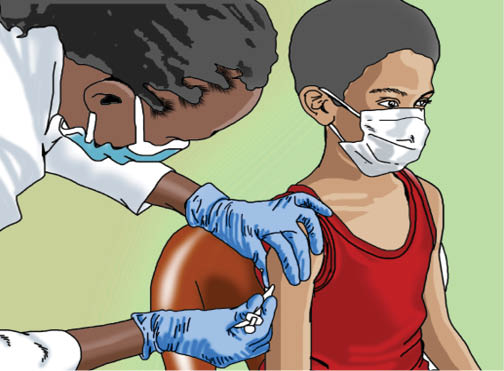Children have continued to die from diseases for which there are preventive vaccines in Nigeria.
This is because children are denied access to routine immunisation or necessary jabs during immunisation exercises across the country.
- We know location of kidnapped ex-Bauchi gov’s relatives — Police
- CNG asks students to join nationwide protest
Findings reveal that some communities and parents across the country do not allow their children to be immunised because of one cultural belief or the other.
Unvaccinated children, therefore, suffer infections, disabilities, and deaths from diseases such as diphtheria, hepatitis B, measles and pneumonia.
This in turn contributes to the high rate of under-five mortality in the country.
In Sokoto State, for instance, our reporter gathered during a field trip that some residents of the state reject immunisation for their children because of political and socio-cultural beliefs.
The field trip was done with the support of the Federal Ministry of Information’s Child Rights Information Bureau (CRIB) in collaboration with UNICEF.
An investigation has revealed that there are a significant number of unvaccinated children in the state and this accounted for the number of cases of ailments and deaths during the last measles outbreak in the state.
Over 1000 measles cases were recorded in the state between January and March, some of which resulted in the deaths of some of the affected children.
The state’s Commissioner of Health, Dr Muhammad Ali Inname, said the measles outbreak was observed mainly among unvaccinated children.
He said a negligible number of vaccinated children were affected but with a very mild form of the disease.
The outbreak was reported to have killed some children in Dan Madi, Kaurare and Aljannare villages in Tambuwal LGA of the state.
Inname said the affected communities were sensitised on the cause of the disease; how it is transmitted and how it can be prevented.
He said drugs were also provided for the treatment of affected children in the areas.
Daily Trust learnt that some residents rejected immunisation because of a cultural belief that vaccinated children grew up stubborn.
“Many people in my area reject immunisation for their children because, according to them, all the stubborn children in our area were fully immunized,” says Malam Ibrahim Goronyo, a resident of Sokoto.
The district head of Gagi, Malam Umar Sani, said, “Some people see any important thing coming to us as an ideology of the western world to control our population. That is why they are not willing to support immunisation exercises.”
He said if people adhered to routine immunization, children would be safe, “because we will stop experiencing child killer diseases like measles.”
The monarch also frowned at the low level of media engagement in immunisation exercises by stakeholders in the state.
On the way forward, he said, “We need traditional rulers’ support on women’s and children’s health issues and there is a need for the involvement of youth and adolescent girls because the girl that will likely get married in the next two to three years when she is sensitized, at least she is equipped with information on the basic needs of children.
“So if she gives birth, she knows that she has to take the child for routine immunization.”
He also stressed the need for the engagement of schoolchildren through the creation of clubs on immunization.
He said traditional rulers could also be trained on how to coordinate and monitor immunisation exercises in their domains.
“They can monitor the people carrying out the exercise; know the number of children vaccinated and those not vaccinated and see how they can intervene,” he added.
The Executive Secretary of the Primary Health Care Development Agency, Adamu Romo, said some people in the state were not allowing their children to be immunised for political reasons.
“Because the government of the day is not from their party, they thus reject anything that comes under this government.
“There are few who are rejecting them for religious reasons and that is why we have an advocacy and social mobilisation department which is headed by vastly learned religious leaders.
“So if there is any rejection based on religion, the committee will convince them of the need to submit their children for immunization, quoting verses of the Qur’an and Hadith.
“That is why this kind of rejection has reduced drastically because we made the heads of those families our ambassadors in their areas.”
He added that cases of rejection are declining significantly in the state, unlike before, when they had to go out every day to attend to such complaints.
On the measures taken to address the issue, he said there were development partners like ‘New Incentive” which were using money to entice women to bring their children for routine immunization.
He added that, they hold a review meeting every day during the exercise aimed at addressing grey areas.
Dr Uche Ewelike, a public health physician and health economist, said if communities embark on good immunization practices by mobilizing a comprehensive vaccination for children 0-5 years, the “herd effect” of vaccines also protects the communities. This, therefore, makes such community healthier and improves the quality of life in such communities.

 Join Daily Trust WhatsApp Community For Quick Access To News and Happenings Around You.
Join Daily Trust WhatsApp Community For Quick Access To News and Happenings Around You.


